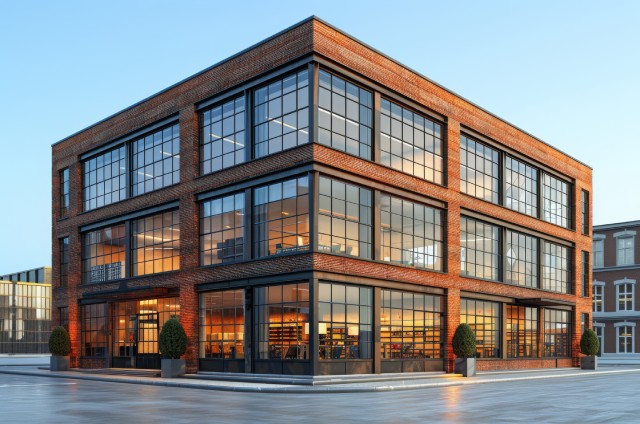Owner-Occupied Commercial Mortgages: Secure Your Business Premises
Are you a business owner considering buying your own commercial property?
An owner-occupied commercial mortgage could be the solution to strengthen your business’s future. This specialised financial product allows you to purchase the premises from which you operate, offering a range of advantages that extend beyond simply having a place to work.
Expert finance advice
tailored to you
Quality service
Fast, friendly and professional service.
Lender Choice
Over 200 Banks, Hedge Funds, Family Offices and more.
Experience
Over 15 years of specialist finance experience.
Bespoke Lending
Finance tailored specifically to meet your needs.
What is an Owner-Occupied Commercial Mortgage?
An owner-occupied commercial mortgage is a long-term loan designed for business owners who want to buy property for their own company’s use.
Unlike residential mortgages, these loans are specifically for purchasing property where you’ll run your business operations.
They can cover a wide range of commercial properties, from shops and offices to warehouses and factories.

The main difference between this and other commercial mortgages is that the property isn’t intended for generating rental income.
Instead, it’s a space where you’ll grow and develop your business.
This type of mortgage typically offers more favourable terms compared to commercial investment mortgages, reflecting the reduced risk to lenders when the borrower directly occupies and uses the property.
Benefits of Owning Your Business Premises
Purchasing your business premises through an owner occupier mortgage presents several advantages:
Financial Benefits
Over time, buying can be more cost-effective than renting. Your mortgage payments build equity in an asset, rather than disappearing as rent. As property values often increase, you’re investing in your business’s future.
Operational Freedom
When you own your premises, you have the freedom to modify the space to suit your business needs without seeking landlord approval. This flexibility can be invaluable as your business grows and evolves.
Stability
Owning your property provides long-term security. You won’t face unexpected rent increases or the risk of being forced to relocate if a landlord decides not to renew your lease.
Tax Advantages
Interest payments on commercial mortgages are tax-deductible, reducing your business’s corporation tax burden.
Asset for Your Business
The property becomes an asset on your company’s balance sheet, potentially strengthening your financial position and making your business more attractive to investors or buyers in the future.
How Owner-Occupied Commercial Mortgages Work
Eligibility Criteria
Lenders typically consider several factors when assessing eligibility for an owner-occupied mortgage:
Business Type
Most types of businesses can qualify, including sole traders, partnerships, limited companies, and LLPs.
Trading History
While some lenders prefer businesses with at least two to three years of trading history, options may be available for newer businesses with strong business plans.
Credit Profile
A good credit profile is always beneficial, but it’s not always a deciding factor. Some lenders specialise in working with businesses that have less-than-perfect credit histories.
Loan-to-Value (LTV) Ratios
The loan-to-value ratio is a key factor in commercial mortgages. Most lenders offer up to 75% LTV, meaning you’ll need to provide a 25% deposit. However, this can vary:
For low-risk industries or strong applications, some lenders may offer up to 80% LTV. Certain sectors, such as medical practices, might qualify for even higher LTV ratios. If you’re considered higher risk, you may need to provide a larger deposit.
Repayment Options
Owner-occupied commercial mortgages typically offer three repayment structures:
Capital Repayment
You pay off both the interest and a portion of the capital each month. While monthly payments are higher, you’ll own the property outright at the end of the term.
Interest-Only
You only pay the interest each month, with the capital due in full at the end of the term. This results in lower monthly payments but requires a plan to repay the capital.
Part-and-Part
A combination of the above, where you pay interest on part of the loan and capital and interest on the remainder.
Interest Rates and Terms
Interest rates for owner-occupied commercial mortgages can be fixed or variable. Fixed rates provide certainty in your monthly payments, while variable rates may offer lower initial costs but can change over time.
Rates typically start from around 2.5% over the Bank of England base rate, but can vary widely based on your business’s financial health, the property type, and the perceived risk.
Loan terms usually range from 5 to 30 years, with 15 to 25 years being common. Longer terms can mean lower monthly payments but more interest paid overall.
The Owner
When applying for an owner-occupied commercial mortgage, lenders will look beyond the business financials to consider the personal circumstances of the business owner.
This is particularly true for smaller companies or newer enterprises, as it helps lenders gauge the overall risk and stability of the loan.
Lenders will evaluate your personal financial position, including assets, liabilities, and income sources outside the business.
A strong personal financial standing can bolster your application, especially if your business is relatively new. Your personal credit score and history of managing debts also play a role, as they demonstrate your financial responsibility.
For limited companies, lenders may require personal guarantees from directors or major shareholders, meaning you could be personally liable if the business defaults on the loan.
Lenders may also assess your personal lifestyle costs to ensure the business can support both the mortgage payments and your income requirements.
While the business’s financials are the primary focus, your personal circumstances can play a crucial role in securing an owner-occupied commercial mortgage, particularly in borderline cases.
The Business
A company’s trading history is a vital factor in the assessment of an owner-occupied commercial mortgage application.
Lenders use this information to evaluate the business’s stability, profitability, and ability to meet mortgage repayments.
Most lenders prefer businesses with at least 2-3 years of trading history. This track record helps demonstrate the business’s sustainability and ability to weather market fluctuations.
They will review the business accounts, focusing on trends in turnover, profitability, and cash flow. Consistent or improving performance is viewed positively.
While historical performance is important, lenders also consider future potential, which is where business plans and financial forecasts come into play.
How the business has handled previous loans or credit facilities can also impact the application, with a history of timely repayments being beneficial.
For newer businesses with limited trading history, lenders may place more emphasis on business plans, market research, and the owner’s experience.
It’s worth noting that a shorter trading history doesn’t automatically disqualify you from obtaining an owner-occupied commercial mortgage. However, it may impact the terms offered, potentially resulting in higher interest rates or lower loan-to-value ratios.
Industries and Property Types Suited for Owner-Occupied Mortgages
Owner-occupied commercial mortgages can be used for a wide range of business types and properties:
- Retail: Shops, showrooms, and salons
- Offices: From small professional practices to large corporate spaces
- Industrial: Warehouses, factories, and workshops
- Hospitality: Hotels, restaurants, and pubs
- Professional Services: Medical centres, dental practices, veterinary clinics

Refinancing an Existing Property
Refinancing can be a smart move if:
- You can secure a better interest rate
- You want to release equity for business expansion
- Your current mortgage term is ending
- You need to restructure your debt
The refinancing process is similar to the initial application, but may be simpler if your business financials have improved since your original mortgage.
Comparing Owner-Occupied vs Commercial Investment Mortgages
While both are types of commercial mortgages, they serve different purposes:
Owner-Occupied Mortgages:
- For properties you’ll use for your own business
- Often have more favourable interest rates
- May offer higher LTV ratios
- Assessed primarily on business performance
Commercial Investment Mortgages:
- For commercial properties you’ll rent out
- Generally have slightly higher interest rates
- Often require larger deposits
- Assessed on potential rental income as well as business performance
Bridging Loans
Sometimes you have to act fast when acquiring commercial property.
If you need to seal the deal earlier than expected it might cause some cashflow issues, particularly if the commercial mortgage is not ready.
One solution could be a commercial bridging loan.
Just like a regular bridging loan, it’s available to help cover a temporary funding shortfall.
learn moreVAT Bridging Loans
When you buy a commercial property it’s highly likely that VAT at the standard rate will be added to the purchase price.
This extra sum won’t be covered by your commercial mortgage so you need to find the cash to pay it until the VAT refund is paid back.
With a VAT bridging loan 100% of the VAT is funded, removing the cash flow pressure on your business.
learn moreThe Advantages of Working with a Commercial Mortgage Broker
Securing an owner occupied commercial mortgage can be complex, but working with a specialist mortgage broker can significantly simplify this journey.
Experienced brokers offer several key benefits:
Brokers have access to a wide range of lenders, including specialist providers that don’t deal directly with the public. This broader access increases your chances of finding a mortgage that suits your specific needs and circumstances.
With their expert market knowledge, brokers stay up-to-date with the latest trends, lending criteria, and products. They can provide valuable insights into which lenders are most likely to approve your application based on your business profile and property type.
By handling much of the search and application work, brokers save you time and stress, allowing you to focus on running your business. They offer tailored advice, understanding your unique situation and recommending the most suitable mortgage options for your goals and financial circumstances.
Brokers can improve your application quality, presenting your business in the best light to potentially increase your chances of approval and secure more favourable terms. Their industry connections and experience often allow them to negotiate better rates or terms than you might achieve on your own.
Throughout the process, from initial application to completion, a broker can guide you, explaining complex terms and ensuring you understand your commitments. If your application faces challenges, such as credit issues or an unusual property type, a broker can help find creative solutions or alternative lenders who specialise in these areas.
While it’s possible to secure an owner-occupied commercial mortgage independently, the expertise and support of a commercial mortgage broker can make the process smoother, potentially save you money, and increase your chances of a successful outcome.
Need some help?
If you need a commercial mortgage or a commercial bridging loan then a specialist broker is a good place to start. You will get expert help and advice along with a wide range of lenders to choose from.
To get matched with a specialist broker, please call us on 0330 030 5050.

